Introduction
I’ve read many wonderful articles, books by some of the World’s top coaches. Between them, they cover the coaching all of the physical attributes needed by athletes in any sport. One area of coaching that I less-often come across, however, is that of the relationship between coach and young athlete and how it can relate to turning a young athlete into a well-rounded person. And that is the key word – “person”. It’s so vital for us, coaches, to remember that when all is said and done, sport is only a single portion of one’s life. It may provide a passionate hobby, or, even a career, but it is still only a portion. What shapes the person’s life is; personal attitudes, belief-systems, ability to take responsibility, personality, and more. The coach can play a huge part in contributing to so much more of an athletes’ life than merely his/her sporting performance. So, here is my philosophy.
First, just a little background on my coaching practice – I have worked with teams, small groups, and individuals, as well as adult general population, and young athletes. The Sports vary – Soccer, Gaelic Football, Hurling, Rugby, Irish Dancing, etc… Currently I am focusing largely on small groups, and one-to-one sessions with young athletes. All of these are at amateur level, and have many ambitions to become elite performers in the future. It is my job to help them, as best, I can, reach their various short and long-term goals. However, no matter their sporting achievements in the future, if I haven’t helped that athlete learn to contribute to society in a much wider scope than playing sports, I consider myself a failure as a coach.
Now, you may be thinking, “that’s what parents are for”. True. But how many of us, as teenagers, or younger, actually listened to our parents? Or took in the lessons about accepting responsibility? Very few. But the power of the “third party” influence is considerable. My athletes take on board lessons from me, which they may not take from their parents. Just like I took them from other adults, when I was their age. I’ve also been a Martial Arts (Taekwon-Do) instructor for 24 years. Because Taekwon-Do training is as much mental, as it is physical, no doubt the ethos I promote, in that, filters in to my S&C coaching also.
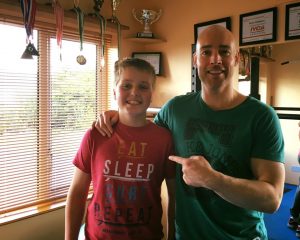
Begin at the beginning
As coaches we all typically start with the assessment of the athlete – posture, gait, etc… as soon as they walk in the door. But there’s more, so much more, right there. What’s the eye contact like? Posture is more than just “posture” – what about “walking tall with confidence?” How do they interact with their parent, with me? Do they speak clearly, or mumble? All of this speaks volumes about their “spirit.” Throughout the assessment I interact with my new young client as much as possible carefully observing how they interact with me. This serves as a good indicator for social skills I will integrate into the coaching sessions.
I also carefully watch any interaction with the parent before, during and after the session to see how respectfully they treat their parent. This is something that may need to be addressed, if necessary, and at the appropriate time.
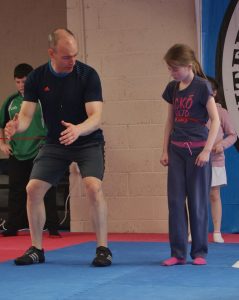
Responsibility
Parents are typically chuffed, if a little surprised, when I ask what their young teenager does at home to help out. Things I am looking for are: making their own bed, putting clothes away, keeping their own space tidy – stuff like that. If the parents are surprised, you should see the look on the kids’ faces. But to me it’s fairly simple – team sports require leaders, especially in important, game-changing moments. Coaches need to try to develop leaders. How can a person expect to take responsibility for a team’s performance, if they can’t take responsibility for looking after their own stuff? Additionally, I remind the young athlete that their parent is paying a lot of money for the privilege of coming to me for coaching. The least they can do is pull their weight at home, and do their best at school.
Sometimes during a Taekwon-Do class, I will do a quick check on presentation by my young students. This includes checking for clean and ironed uniforms. Now, can we expect a ten-year-old child to wash and iron his uniform? Of course not. But we can certainly expect them to put the uniform in the laundry after class, to make sure it is washed. And it is not a big deal to check with a parent if it was ironed, a couple of days before the next class, instead of 5 minutes before they are due to leave. All it requires is taking some responsibility. These are things us coaches can pass along. I learnt how to sew a patch on my uniform, when I was a teenager, from my own instructor, at the time, Master Don Dalton. It was a bloodbath, but I got better with a needle and thread.
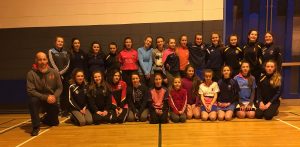
Talent or Presentation?
A current mentor of mine Master Mark Hutton, from Glasgow constantly reminds people that it is often not the most talented people who get the best jobs and opportunities in life, but usually those with the best communication skills. Talented people who cannot step outside of their comfort zone, and stake claim to opportunities when they arise do, indeed, often miss out. Helping our athletes with eye contact, speaking clearly, etc.… can transform their lives inside and outside of Sport.
Self-belief
Only a percentage of the athletes we coach will ever make it really big in sports. That is just a fact of life. But that doesn’t mean they cannot be winners in life, and reach their full potential at whatever level they play at. As well as coaching all the physical attributes they need to reach that potential, we have a responsibility, in my opinion, to instil attributes, such as self-belief and self-esteem as well. Missing team selections, match losses, these are all opportunities to learn and grow. The coach that will be remembered, for all that person’s life, is one that can put these disappointments and challenges in perspective, and show that self-image is more than what you achieve.
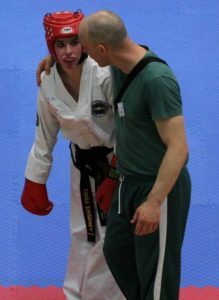
Relationship
So how can a coach manage all this? Well, it really boils down to the type of relationship that you develop with your athlete. What is a coach? A friend? A mentor? Maybe a combination of both? This is an important factor because they are not the same. After all, a friend tells you what you WANT to hear, whereas a mentor tells you what you NEED to hear. In my opinion, there’s a place for both, in the right circumstances. Experience and judgement will tell you what those circumstances are.
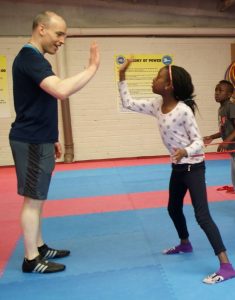
Basically, you have to give a damn about your athletes beyond how they perform, especially when it’s young athletes you coach. That means getting to know them – age, school year, pets, other interests, so you can connect and use analogies that they can relate to.
I am now teaching the child of one of my former students. I can think of no greater honour than making an impression on your athlete so great that they return years later wanting their own child to learn from you.



That is really an inspiring but as well very practical approach to coaching. Integrating self-awareness to behavioural development, to co-create an independently thinking member of a society. As a sociologist and future psychotherapist, I can only say, that I would wish to see more personalities like Shane Fitzgibbon in our communities. By entrusting our children into the hands of experienced and emotionally intelligent guides, we give them the best start in life.